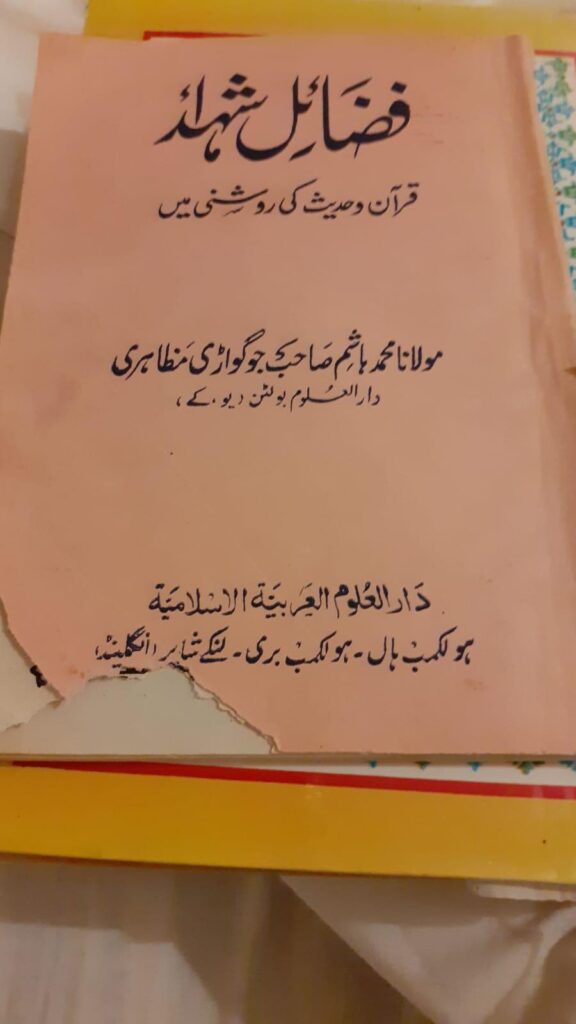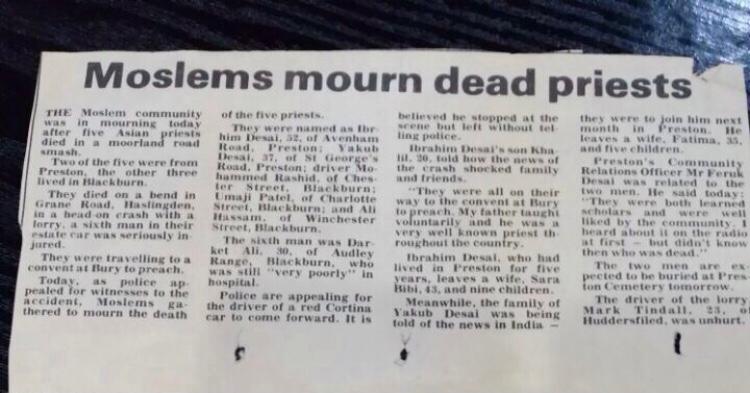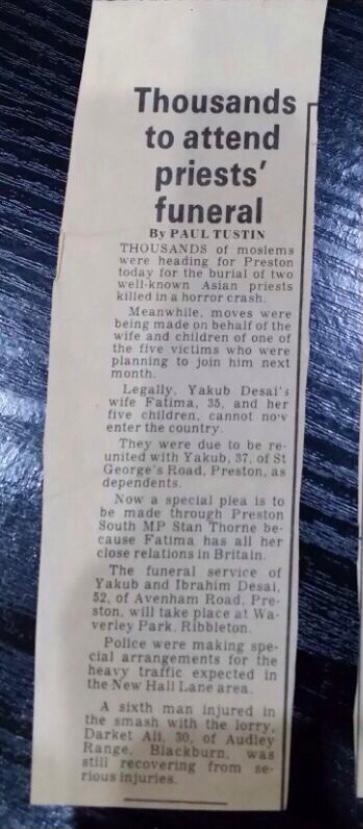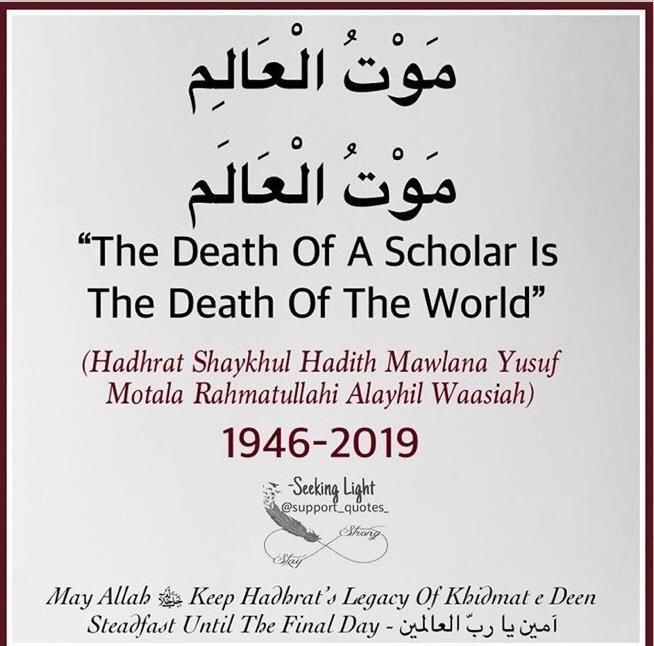by Hadhrat Mawlānā Muhammad Saleem Dhorat Saheb (hafidhahullāh)
Once, ‘Umar radhiyallāhu ‘anhu asked those around him of a hadīth of the Prophet sallallāhu ‘alayhi wasallam with regards to the trials and tribulations which were to fall upon the Ummah. Hudhayfah ibn Al-Yamān radhiyallāhu ‘anhu, who knew the hadīth, remarked, “Why do you worry about such a fitnah, O Amīr-al-Mu’minīn, when there is a closed door between it and yourself?” When asked who this ‘door’ was, Hudhayfah radhiyallāhu ‘anhu replied, “Umar radhiyallāhu ‘anhu.”
The existence of pious and righteous servants of Allāh ta‘ālā amongst us is a barrier that stops the torrents of evil from emerging and causing havoc. Upon their demise, the doors to these evils are opened, and the people are tested by trials and tribulations. That is why, as time draws nearer to the Day of Judgement (during which trials and tribulations will increase), the passing away of pious servants of Allāh ta‘ālā become more frequent.
In November 2012, a pious and righteous servant from amongst this category, my most honourable and beloved teacher, Hadhrat Mawlānā Ismā‘īl Wādī sāhib rahimahullāh, of Blackburn, UK, passed away. I had studied the revered subjects of ‘aqīdah, hadīth and fiqh under his tutelage when I was studying at Dār-al-‘Ulūm Bury.
My Last Meeting
Alhamdulillāh, I was fortunate to have visited him the weekend prior to his demise, after having been kept informed of his condition during the week. This was despite the fact that I myself was not in the best of health, but Allāh ta‘ālā favoured me greatly by granting me the courage to undertake this very important journey, accompanied by my dear Mawlānā Ahmad Patel and Muftī Ismail Bhayat.
Upon reaching Blackburn, I was treated as always, with love and respect by the members of the household, and was immediately taken upstairs into the room where Hadhrat Mawlānā rahimahullāh was resting. I was grieved to see him lying unconscious on his bed, which was set so that his face was facing the Qiblah, as is the sunnah for the one in his last moments. I was given the opportunity to sit right next to the bed and I sat, holding his hand, reciting surah Yāsīn, and due to love for Hadhrat Mawlānā rahimahullāh, tears began to roll down my cheeks. After a while, Muftī Saalih sāhib, the son-in-law of Hadhrat Mawlānā rahimahullāh and the Imām of Masjid Noorul Islam Blackburn, who loves me dearly, tried to awaken Hadhrat Mawlānā rahimahullāh by informing him of my arrival, but he did not respond. I was informed that he had been in this condition since the morning, and that the doctors had said that he was in his last moments. All his organs had started failing, but the serenity was apparent on his face. The medical experts were unanimous that they had not seen a patient in this condition, who was without any sign of pain, hence he was not administered with morphine. I stayed in the room for at least half-an-hour, silently reciting surah Yāsīn, salāt and salām, dhikr and making du‘ā when we were all asked to leave the room for a little while so that necessary medical checks could be carried out.
When we went back inside, Muftī Saalih sāhib again attempted to inform Hadhrat Mawlānā rahimahullāh of my presence, and this time to my fortune he opened his eyes. Everyone present became delighted. I greeted him with salām, to which he replied. He was made to sit up, and taking this opportunity I placed his hand on my head and requested him to make du‘ā for me and all, to which he obliged. My happiness knew no bounds. I was sure Allāh ta‘ālā had been extremely merciful to me.
This was the highlight of this journey and I was extremely delighted to have had the honour of greeting him and gaining his du‘ā. Thereafter, I advised Muftī Saalih sāhib that the menfolk should leave the room so that the household womenfolk could have an opportunity to visit Hadhrat Mawlānā rahimahullāh also, whilst he was conscious. We went downstairs and sat with the male family members, discussing the life and salient characteristics of Hadhrat Mawlānā rahimahullāh.
Birth and Childhood
Hadhrat Mawlānā Ismā‘īl Wādī sāhib rahimahullāh was born on 28th Jumādā Al-’Ūlā 1339AH/7th February 1921, in Lājpūr, Gujarat, India. He started his elementary Islamic education at the age of 8, started memorising the Qur’ān at 10, and finished in two years at the age of 12, in his home town.
Higher Education
In Shawwāl 1353AH/January 1935, at the age of thirteen, he enrolled in the renowned madrasah Jāmi‘ah Islāmiyyah in Dabhel, India, where he started his ‘Ālimiyyah course. This is where he completed his studies in Sha‘bān 1364/July 1945, except for a year in between during which he studied in Jāmi‘ah Husayniyyah in Rander, India.
During his time in Dabhel, he was blessed to have great luminaries as his teachers. He studied the Sahīh of Imām Al-Bukhārī under Muftī Shafī‘ Al-‘Uthmānī sāhib rahimahullāh and Mawlānā Shams-al-Haqq Al-Afghānī sāhib rahimahullāh; At-Tirmidhī under Mawlānā Zafar Ahmad At-Thānwī sāhib rahimahullāh; and Mishkāt-al-Masābīh and Jalālayn under Mawlānā Badr-‘Ālam Mīrthī sāhib `rahimahullāh. He then went on to further enhance his education at Dār-al-‘Ulūm Deoband, where he studied Ṣaḥīḥ-al-Bukhārī again under Shaykh-al-Islām Mawlānā Husayn Ahmad Al-Madanī sāhib rahimahullāh. He then went to Lahore in Sha‘bān – Ramadān 1365AH/July 1946, studying tafsīr under Shaykh-at-Tafsīr Mawlānā Ahmad ‘Alī Al-Lāhorī sāhib rahimahullāh.
Religious Service
After finishing his education, he returned to his hometown, Lājpūr, and started as an imam in his local masjid. He then travelled to Madagascar in 1952 and settled there, serving the Dīn of Allāh ta‘ālā for 21 years, until he arrived in the UK in 1973. He served as the Imām in Masjid Noorul Islam in Blackburn until he retired in 1988 due to weakness and old age. He also taught at Dār-al-‘Ulūm Bury from 1978-1988, without any remuneration.
Status in Academics
He was both pious and knowledgeable. His level of knowledge can be gauged from the fact that after his graduation he spent many years without having had the opportunity to teach Higher Islamic sciences. As it is common knowledge that after graduation in any field, if a long span of time was to pass by without practicing in that field, the graduate somewhat loses touch with the sciences learnt. However, Hadhrat Mawlānā Ismā‘īl Wādī sāhib rahimahullāh, despite such a lengthy gap between graduation and the opportunity to teach, taught these difficult subjects and satisfied his students.
Khilāfah
Hadhrat Mawlānā Ismā‘īl Wādī sāhib rahimahullāh was in his nineties at the time of his demise, and Allāh ta‘ālā had blessed him with a life of unimaginable steadfastness and piety. He attained khilāfah (discipleship) from the esteemed late Shaykh Ghulām Habīb sāhib rahimahullāh during hajj in 1974, and from Hadhrat Mawlānā Abrār Ahmad Ad-Dhulyawī sāhib rahimahullāh, who was the khalīfah of Qārī Muḥammad Tayyib sāhib rahimahullāh.
His ‘Ibādah (worship)
He was an embodiment of steadfastness, a true and dedicated Muslim who was always connected to the masjid, had true love for the Qur’ān and for standing in ṣalāh for long durations. He was very punctual in Tahajjud, reciting 10-12 Juz’ daily, which he increased to 15 in the latter stages of his life. This meant that he would complete approximately one recitation of the Qur’ān every day, including the portions he would read in other nawāfil and otherwise.
In winter, he would go to the masjid before Zuhr and return after ‘Ishā! He would remain engaged in ‘ibādah. He would stand in qiyām for hours. I once went to the masjid after Maghrib salāh to meet him, where I found him alone, engaged in salāh. I waited for him for approximately an hour, but there was no sign of him going into rukū‘ and I had to leave without meeting him, because of prior commitments.
Salāh with Jamā‘ah
Whilst he was the Imām at the masjid, he did not miss a single ṣalāh during the fifteen years, and even after retiring in 1988, for a full twenty years before his illness in 2008 did not miss a single takbīr-at-tahrīmah (The first takbīr of salāh).
Once, during the period after 2008, he arrived late into the masjid and missed one rak‘ah. He stood in qiyām of that one rak‘ah for so long that the masjid emptied. When he finished, he was asked regarding his lengthy qiyām, to which he replied that today, I missed one rak‘ah, so recited two and a half juz’, and reprimanded the nafs saying, “Even at this old age, you still cannot arrive on time for salāh?” This was when he was approximately 80 years old.
Adherence to the Sunnah
Hadhrat Mawlānā rahimahullāh was also very particular with regards to sunan, mustahabbāt and ādāb. Once, while in hospital and very weak, he felt the need to relieve himself. With the assistance of his son, he made his way to the toilet, which was at quite a distance. Upon reaching the toilet, he realised that he had forgotten his topī (head gear). He insisted and his son had to make him sit at an appropriate place, retrieve the topī from his bedside and it was only then that he entered the toilet.
Humbleness
Despite such excellent qualities found in his life, he lived a simple life very much unknown by the general public, and would dislike being brought into the limelight.
Hadhrat rahimahullāh and the IDA
He had much love for this humble one, and would always enquire and ask about the Islamic Da‘wah Academy and its progress. Rather, I regard his blessed du‘ā to be one of the main catalysts for the success of the Islamic Da‘wah Academy.
In 1996, a few days after the purchase of the property where the Islāmic Da‘wah Academy is today, we were fortunate that Hadhrat Mawlānā rahimahullāh visited Leicester. Upon my request, he came into the former building and asked for some seating arrangements to be made. As the building had just been purchased, there was no carpet inside, hence a piece of carpet was brought and Hadhrat Mawlānā rahimahullāh, myself, and the rest of those present sat down. Hadhrat Mawlānā rahimahullāh asked someone to recite a portion of the Qur’ān and thereafter gave a few advices. After his short talk ended, he sat looking downwards, deep in thought. He then suddenly looked up and said to me, “Mawlānā! Make an intention to initiate a Dar-al-‘Ulūm here!”
I was taken aback by this instruction, as this area and building had just been bought, for the sole intention of expanding the IDA’s da‘wah activities and to cater for the evening classes which were taking place at the time in the premises of the IDA on 186 Melbourne Road. For this reason, I did not reply, as I felt that it would be incorrect to make such a promise when the intention was not there. However, Hadhrat Mawlānā rahimahullāh continued to insist. At this point, I thought to myself that inshā’allāh, it would be possible to teach three or four years of the ‘Ālimiyyah course in the future, and mentioned accordingly to Hadhrat Mawlānā rahimahullāh. He replied, “No! You must continue until Al-Bukhārī and you must teach [Sahīh-] Al-Bukhārī!” Upon this, I thought that a very pious person is insisting on a pure and good cause, therefore I should follow his instruction, and eventually I made the intention and requested Hadhrat Mawlānā rahimahullāh to make du‘ā. He was so serious regarding this instruction of his that after this, whenever I would meet him, he would ask with regards the progress of the Dār-al-‘Ulūm and further emphasise that I must continue running the madrasah up until the final year wherein Sahīh Al-Bukhārī is taught, and to teach it myself.
Demise and funeral
This very affectionate teacher of mine breathed his last on Monday, the 6th of Muharram, coinciding with the 19th of November 2012, when the adhān of Maghrib salāh was being called out. I was grieved with this sad news. An announcement was made at the IDA for du‘ā and īsāl-ath-thawāb for the respected Hadhrat Mawlānā rahimahullāh, and the following day I, along with approximately eight members from the staff of the IDA arrived before Zuhr ṣalāh at Masjid Noorul Islam. There, in the foyer was my beloved teacher, resting in peace after his hard work of ninety years. Before ‘Asr, the salāh-al-Janāzah was led by Hadhrat Mawlānā rahimahullāh’s son, Shaykh Qasim hafizahullāh, and was attended by hundreds of people, including leading personalities from all over the UK. Finally, he was laid to rest just before Maghrib ṣalāh in Blackburn cemetery.
May Allāh ta‘ālā forgive his shortcomings, fill his grave with nūr and make it a garden from the gardens of Jannah, and elevate his rank in the Hereafter. It is my fervent desire that each associate of mine perform whatever good he/she can and ask Allāh ta‘ālā to write its reward in his book of deeds. May Allāh ta‘ālā grant him all the good of the Hereafter and the company of the Ambiyā, the Siddīqūn, the Shuhadā and the Sālihūn in Jannah-al-Firdaws. Āmīn.
Courtesy: Riyādul Jannah, Vol 22 Issue 1 (January 2013/ Rabī‘ul Awwal 1434)








